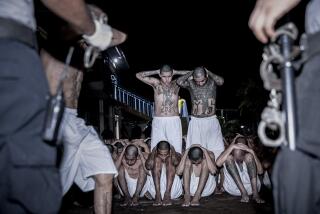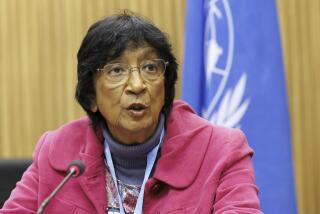Rights Abuses Found to Continue in Tibet
- Share via
BEIJING — Although conditions in Tibet have improved greatly in recent years, systematic abuses by the Chinese of basic human rights continue, according to an Asia Watch report made available to reporters here Thursday.
“The people of Tibet are still not free to practice their religion as they choose, nor to express their opinions on political issues. Moreover, they continue to suffer discrimination, arbitrary arrest and imprisonment, and even torture,” Jack Greenberg, deputy dean of the Columbia University School of Law and chairman of Asia Watch, stated in a news release summarizing the Washington-based human rights organization’s report.
The report, based primarily on information gathered by Asia Watch in Tibet last year, acknowledges that “the present period in Tibet is indeed a more open and relaxed one” than the period from the late 1950s to the late 1970s, which saw massive destruction of Tibetan monasteries and suppression of religious activity.
“There is a good deal of respectable cultural and scholarly activity going on in Tibet. Monasteries have been reopened, and religion is once more in evidence . . . (but) despite liberalization in some areas, political imprisonment, torture and discrimination are also characteristic of the current situation in Tibet,” according to the report.
The report estimates that at least 300 to 400 Tibetans were arrested in the aftermath of anti-Chinese demonstrations and rioting last September and October, which drew worldwide attention to the question of human rights in Tibet.
Over the centuries, Tibet has sometimes been part of China and sometimes independent. China has controlled Tibet since 1951. But many supporters of the exiled Dalai Lama--Tibet’s former theocratic ruler who fled to India in 1959 after an abortive rebellion--hope to make the region independent. Beijing views pro-independence activity as treason.
Foreign Reporters Banned
China has acknowledged six deaths in last fall’s rioting, while most Western reports have put the number at seven to 14. Almost all foreign correspondents have been banned from Tibet since shortly after the incidents occurred.
The official New China News Agency reported last month that “more than 80 people” were detained in connection with the rioting, that 13 were released in October, 59 were released in January and “over 10” remained in custody.
The Asia Watch report states: “Torture is not spared in the interrogation of political prisoners, according to informed and credible observers in Tibet. It is a means for obtaining information and for dealing with recalcitrant prisoners.”
The report quotes an unnamed Tibetan who said, “If one speaks forcefully, if one gives an account of Tibet as being independent, they apply cattle prods (in Tibetan, glog-gi rgyug-pa, literally ‘electric batons.’) One’s feet are shackled, one’s arms are shackled. The whole body trembles, and one cannot speak.”
Beijing’s official position is that there are no political prisoners in China, only people convicted of crimes that may include counterrevolutionary activity or treason. The Asia Watch report also states that despite an official Chinese denial, it is believed that Geshe Lobsang Wangchuk, the best-known pro-independence activist imprisoned in Tibet, died in prison last Nov. 4 at the age of 73.
The report names seven other political prisoners, including Panden Gyatso, a monk from Drepung monastery. When a group of Beijing-based foreign correspondents visited Tibet in 1983, according to the report, Panden Gyatso “is said to have passed on to some of them a written appeal for Tibet’s independence.”
Other Tibetans passed similar appeals to the correspondents, according to the report. Tibetan exile sources later claimed that 500 Tibetans, including Panden Gyatso, were arrested in connection with the foreign correspondents’ visit.
Discrimination against ordinary Tibetans was reported in housing, education and employment.
More to Read
Sign up for Essential California
The most important California stories and recommendations in your inbox every morning.
You may occasionally receive promotional content from the Los Angeles Times.













